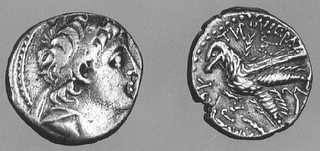
Read first Matthew 25:14-30.
A Roman denarius from the mid-first century B.C.E found under a doorway at the Qumran excavation site in 1955We love to tell stories. We like to listen to stories. Stories are imitations of our experiences in life. They present a better world which listeners and readers can dream of. At times, they shape our decisions in life. We come up to a crucial decision after watching a good movie, for instance. Many of us who grew up in the Ilocos region in the early 70's learned what is right from wrong by listening through the radio the Stories of Uncle Pete (Sarsarita ni Uncle Pete).
The parables of Jesus are also stories, but not like ordinary stories that have happy endings and clear moral lessons. Parables, by nature, leave the listeners with more questions in mind. The word, "parable", comes from the Greek paraballo meaning, "to throw beside". Parables, literally, "throw beside" the listeners's minds —to think and rethink. A good example is the Parable of the Talents (Mt 25:14-30).
The master in the parable entrust his "talents" to three servants. How much is one talent at that time (1st century A.D.)? ---6,000 denarii! One denarius is a day's wages for an ordinary laborer. One talent would be worth twenty year's wages; two talents = forty years' wages; five talents = a hundred years' wages! Who in their right minds entrust such extremely huge amount?
The servant who receives the five talent immediately "went and traded with them" (and presumably the second who receives two talents does the same). That implies that both engages in some kind of business. The third servant , receiving one talent, buries the money to the ground. Don't think that the guy is stupid. That's the normal and safest way to keep money that belongs to others. Jewish writings have something on this: "Money can only be guarded by placing it in the earth. . . Anyone who buried a pledge or a deposit immediately upon receipt of it, was free from liability." And to the two servants who invest the talents, this is what Jesus says: "If you have money, do not lend it at interest, but give it to one from whom you will not get it back" (from the Gospel of Thomas but see also Luke 6:35). So who is doing right?
When the master returns, accounting begins. The two servants who received more have doubled the amount. Impossible! The rate is incredibly higher than Five-Six, a Filipino money lending business where five currency units are loaned without collateral and expecting six in return immediately. The legal interest rate in the first century was only 12 percent! But note that the third servant, who did the right thing, is now condemned because he is "lazy" and does not know that his master "harvests where he does not plant". Amazing.
What's the end of the parable? That servant is thrown "into the darkness outside, where there will be wailing and grinding of teeth." We are not told exactly where is this place, but surely a place of shame. When we grind our teeth in sleep, they say we carry a lot of worms in our stomachs ("binubulate"). Poor guy, he was just doing what he was supposed to do.
The following essay will appear in the SVD Bible Diary 2007. This book offers a daily explanation of the Gospel reading in the Mass, authored by members of the missionary congregations inspired by St. Arnold Janssen. It will be out in the bookstores soon. You can place your order in advance:
Logos Publications
P.O. Box 1375, 1099 Manila, Philippines
e-mail: info@logospublications.com
www.logospublications.com
No comments:
Post a Comment